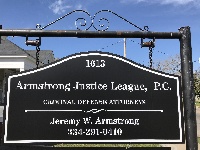Cottonton RICO Act Lawyer, Alabama
Sponsored Law Firm
-
 x
x

Click For More Info:
-
The Law Offices of Richard L. Cooper, P.A.
848 Brickell Avenue Suite 800 Miami, FL 33131» view mapDWI/DUI, Drug Trafficking, Felony Nationally Ranked Top 40 Under 40
With Richard L. Cooper you can expect a trusted confidant who will work diligently to fully understand your case and determine a road map to help you regain control of your life.
800-756-2781
Not enough matches for Cottonton RICO Act lawyer.
Below are all Cottonton Criminal lawyers.
Jeremy W. Armstrong
✓ VERIFIEDI have spent my entire legal career in the criminal justice system as a former prosecutor and a criminal defense attorney since October 2000. In Apri... (more)
Will O. Walton
✓ VERIFIEDAfter many years of practicing law with a large prestigious firm, Trip Walton decided to build his own firm around a core of attorneys with superior t... (more)
Benny Hand
✓ VERIFIEDBen Hand is the founding partner of Hand Law Firm, LLC. as well as a partner in Hand & Hand Mediation, LLC. Ben was admitted to the Bar in Alabama in... (more)
Connie Jo Cooper
FREE CONSULTATION
CONTACT
 Richard L. Cooper Miami, FL
Richard L. Cooper Miami, FL AboutMiami Attorney at Law
AboutMiami Attorney at Law ServicesCriminal Defense
ServicesCriminal Defense



